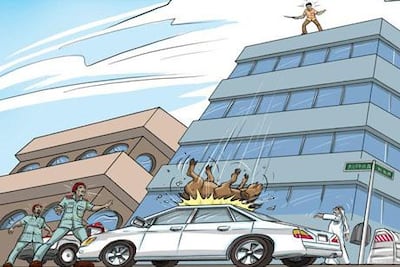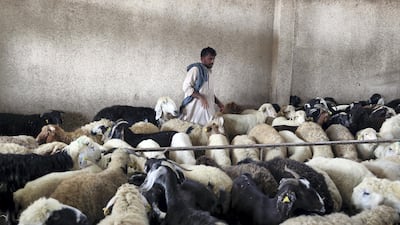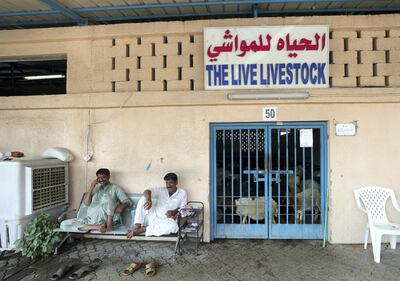Thousands of people attended livestock markets across the UAE on Tuesday to buy goats, sheep and bulls in readiness for the Eid Al Adha sacrifice.
Animals rumbled in by the lorry load from Al Ain in the emirates and by dhow from Pakistan, Sudan and Somalia.
Keen-eyed customers were quick to hunt out the best deals for their coming feasts, carefully judging the animals from teeth to tail.
And families could be overheard eagerly discussing how best to cook their chosen dish: this sheep should be perfectly cooked in fermented dried yoghurt said one; that Najd goat should be topped with garlic, vinegar and tomato, said another.
Ahmed Shoaib, an Emirati business owner, said he was looking to buy a bull and three goats for Eid Al Adha this year.
He strolled through one market tucked away near Mina Zayed in Abu Dhabi with his two-year-old son, Ibrahim, by his side. His wife, Angela Ahmed, looked on from the comfort of their air-conditioned SUV.
Every year the couple donate some of the meat they buy to cleaners, cooks, and watchmen, as well as Mr Shoaib’s employees.
“It’s a sacrifice and we have to give to the people,” he said. “We want to give as much as we can.”
_______________
Read more on Eid Al Adha 2018:
Eid prayers at Abu Dhabi mosque offer home comforts for Palestinian families
Eid Al Adha prayers around the world - in picture
Henna artists tell of sleepless nights and caffeine fixes ahead of Eid
_______________
Eid Al Adha - meaning festival of the sacrifice - commemorates Ibrahim’s willingness to follow God’s command to sacrifice his son, Ismail.
Having proven his obedience, God provides Ibrahim with a ram and instructs him to slaughter the animal instead.
Today, the meat from every animal slaughtered during the festival is divided into three. A third is donated to the poor, a third is given to friends and neighbours and the remainder is kept for the buyer.
The slaughter itself is also seen as intrinsic to the celebrations, and in previous years people have traditionally butchered the meat at home.
Nowadays, however, cities like Abu Dhabi pride themselves on law and order and cleanliness, and authorities have largely put a stop to unlicensed butchery. Instead, the animals are killed at municipality abattoirs.
In 2011, police even issued a cartoon with a real-life cautionary tale of a sheep that leapt off a five-storey building to avoid being killed.

The goat market down in the Corniche in Abu Dhabi is as orderly as the city, with tidy rows of open pens well ventilated by fans. But Eid in August still leaves man and beast sweltering from the humidity. Pakistani and Egyptian livestock traders suffer the heat every bit as much as their animals.
Ahmed Narfeh of Jordan and his uncle Ibrahim Al Jabri said they were looking to spend between Dh400 to Dh500 on meat.
“We’re going to buy a goat on the second day of Eid (Wednesday) so that prices will be cheaper,” Mr Narfeh said.
“We will also get 15kg of meat from a sheep and divide it. We’ll buy either a local sheep or one from Pakistan because they’ve grown up grazing rather than on feed.”
Eid Al Adha also means a week of 14-hour days for the traders.
“All the people here are good, the price is good and the goats are good," said Abdul Jabbar Daad Khan, a trader who has worked at the market for 20 years. "The people are happy, and all is well, praise be to God.”
As for his Eid feast?
“Just a plate of chicken," he said. "With all this business, who has time to cook a goat?”


